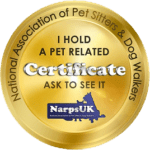Aromatherapy and dogs
Essential oils work on humans
You may have heard about the healing properties of essential oils and many people use them in their homes and to help aches, ailments and to help uplift and change your mood.
With the recent rise in interest in essential oils, many pet owners are curious about this approach and wonder if it will work on their pets?
Is it a good idea?
Could they have similar effects on our dogs? And which oils are safest for our canine family members?
Essential oils are thought to help with everything from skin irritations to fighting fleas. Lavender is popular for dogs because of its reported calming effects, for example.
Many dog owners add a few drops of lavender to the essential oil diffuser before they leave the house to help calm nervous dogs, or odour control, or giving a light massage with frankincense in a carrier oil, and more.
How is quality determined?
Essential oils are extracted from plants and the quality of the oil is impacted by several conditions – the sunlight, altitude, and even how much water a plant receives. Aromatherapy is the use of essential oils – the concentrated, aromatic oils extracted from plants through distillation, most often by steam.
Essential oils produced for aromatherapy use are typically processed with a great deal of care. Why? Well, they’re costly! For instance, 100kg of lavender yields just 3kg of lavender essential oil.
Purity, however, doesn’t equate to safety – just like the word “natural” doesn’t mean “safe to use.” Essential oils are very potent because they’re so concentrated. That’s why they’re best diffused via steam and must never be given to your pet to ingest. Most veterinary experts also advise against using them topically. If used topically, they must be diluted in what’s known as a carrier oil; always consult with a vet before attempting this.
If they’re not used properly, certain essential oils pose a risk to dogs.
What we recommend
We, at Rose Cottage, recommend using essential oils in a diffuser.

LESS IS MORE.
- A rough guideline is to add about 3-6 drops of essential oils to 30 ml (1 oz.) of carrier oil.
- Use a smaller amount of diluted oils on small dogs vs. big dogs – and fewer amounts of diluted oils on puppies and senior dogs.
- Use a diffuser to help keep dogs calm.
- Do not use around eyes, ears, nose, or genitals.
- Exercise caution with pregnant or nursing pets
- Know your pet’s health status and behaviour, and discontinue use if concerns arise.
More safety tips
Dogs are more sensitive to essential oils than humans, so even if you’re familiar with them for yourself, remember that it’s a different story with your dog.
- Only use essential oils with your dogs to address a specific, ongoing and active concern – not to “prevent” a health issue.
- Do not add essential oils to your dog’s food or drinking water.
- Avoid using essential oils with puppies under 10 weeks of age and with pregnant or nursing dogs.
- Do not use oils on epileptic dogs or dogs who are prone to seizures.
Symptoms of essential oil poisoning in dogs
If essential oils are kept within reach of your pet, you run the risk of accidental ingestion. Watch out for these symptoms:
- Muscle tremors
- Weakness
- Difficulty in walking
- Low body temperature
- Excessive salivation
- Vomiting
- Excessive pawing at mouth or face
- Drooling
If you suspect your dog has ingested an essential oil, call your vet.
Not to scare you
Essential oils are an incredible addition to yours and your pets life. They help purify the air; helping rid odours and also help keep your beautiful dog calm.
Doggy-Safe Essential Oils:
We recommend our Pup & Pony Blends, which include only safe essential oils. These were carefully formulated with your pup in mind and cover a wide variety of both physical and emotional issues.
Safe single oils include Cedarwood (all varieties), Chamomile (all varieties), Eucalyptus Globulus & Radiata, Frankincense (all varieties), Lavender, Mandarin, Palmarosa, Sweet Orange, Sandalwood (all varieties), and Vetiver.

Essential oils to avoid include Anise, Blue Tansy, Camphor, Clove, Garlic, Oregano, Tea Tree, Wintergreen, and Yarrow.
Where to buy
Rose Cottage of course. Just ask us for more information on diffusers and essential oils that we stock.
Love
Dawn, Lilly and Tucker











